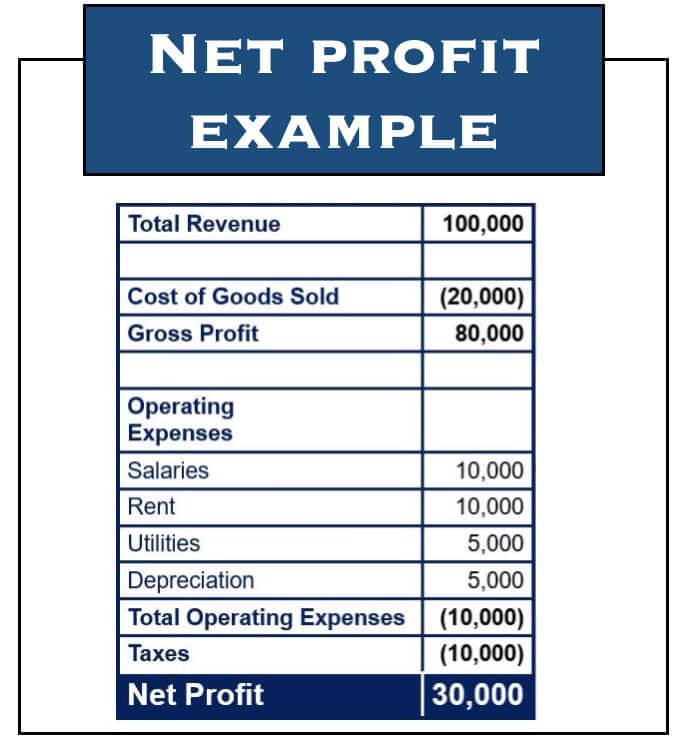Net profit, also called Net Earnings, Net Income, and informally The Bottom Line, is calculated by adding up a business’ total expenses, and subtracting that from its revenue – this shows what the company has either earned or lost over a specific accounting period, which could be one month, one quarter, six months, or one year.
The net profit of a company, organization, or any individual or entity that does business, is its profit after operating expenses and all other charges including depreciation, interest, and taxes have been deducted from total revenue.
Company’s financial health
Net profit is a key indicator of a company’s financial health, reflecting its ability to convert revenue into actual profit effectively.
If total expenses and charges are greater than revenue, the business incurs a net loss, if expenses and charges are less than total revenue, it has made a net profit. Expenses are what the company spends.

The synonym ‘bottom line’ results from the traditional appearance of an income statement which shows all allocated expenses and revenues over a given accounting period with the resulting summation on the bottom line of the report.
Net profit – income statement
Net profit forms part of a business’ income statement. The income statement itemizes sales and expenses of a past accounting period that led to the current profit or loss, and indicates what could be done to improve the results.
As opposed to a balance sheet, an income statement describes what happened over a month, quarter or 12-month period.
Net profit (net income) increases the stockholders’ equity from the operations of a business.
Net profit usually factors in tax paid
Definitions of net profit can vary slightly between countries. It does not always have exactly the same meaning in the UK and US, where net profit is typically associated with net income or profit after tax.
In Britain, net income may be known as ‘profit attributable to shareholders’. However, with globalization there is a great deal of overlap, and any differences that used to exist are gradually disappearing.
 The concept of money, business, profit and loss knows no boundaries.
The concept of money, business, profit and loss knows no boundaries.
In order to overcome any ambiguity regarding tax, many journals and companies report the figure as ‘net profit before tax’ or PBT.
Net Profit vs. Gross Profit
Gross profit refers to sales revenues minus the cost of goods sold.
Net Profit may have a number of meanings. Most people assume that it means the revenues minus all expenses – including the costs of goods sold, SG&A (selling, general and administrative) expenses, non-operating expenses, and in most cases after income tax expense.
Profit or profits?
If you Google the word, both terms – profit and profits – are commonly found. So what is the difference or which one is correct?
Technically, profit is known as an uncountable noun, just like the word water is – we say ‘much/less water’ and not ‘many/fewer waters’ (unless we are comparing different types, such as mineral water, tap water, sea water, river water, etc.).
So, if you are talking about different types of profit, you would have to add an ‘s’ to the end. For example “Profits from different products in our company were impressive this year, except for smartphones.” This means profit from laptops, profit from routers, profit from wireless keyboards, and profit from computer peripherals did well, but not from smartphones – the phrase is comparing different types.
American and British English
However, the plural countable form is also commonly used when one would expect just the singular uncountable form. On both sides of the Atlantic, profits and profit are used interchangeably, perhaps slightly more so in the United Kingdom. So, even though technically ‘profit’ is an uncountable word, is commonly used as a countable.
Below are some examples of profit and profits used in sentences:
- “Profits this year have improved compared to last year.”
- “How are we expected to make a profit after such a massive increase in taxes?”
- “Our profits from trucks were used to expand our aerospace division.”
- “John Doe Inc. made a profit of $30m this year.”
- “The movie Avatar made a record profit in 2009.”
Advancements in data analytics have allowed companies to more precisely predict future net profits by analyzing trends and various financial indicators.
